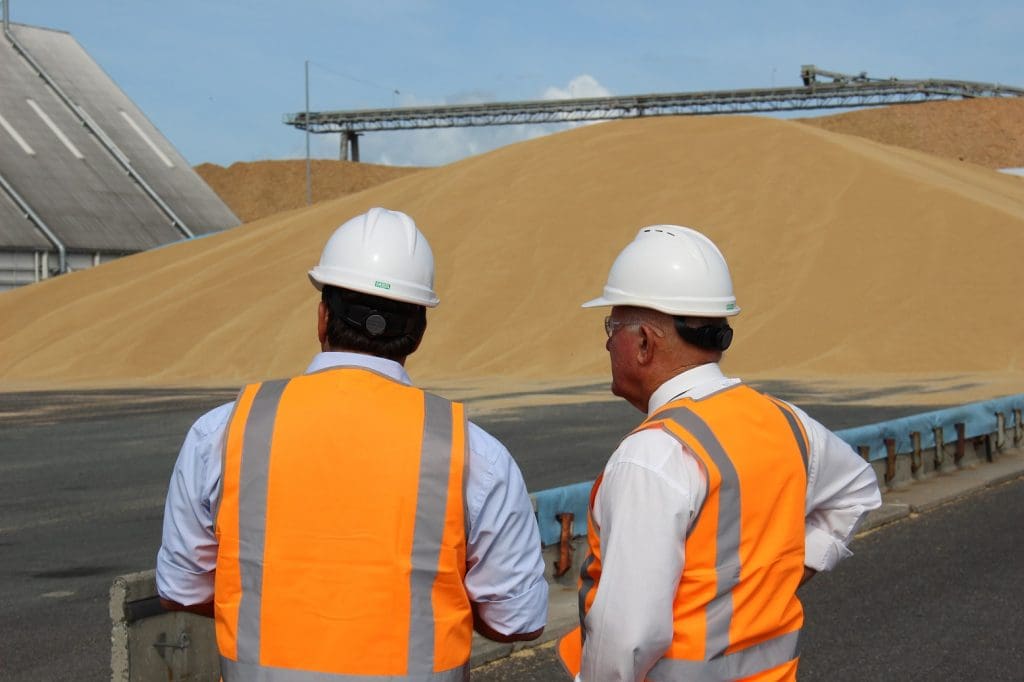
GrainCorp’s facility at the Port of Brisbane.
GRAINCORP has reported a half-year Earnings Before Interest, Tax, Depreciation and Amortisation figure of $236 million and an Underlying Net Profit After Tax of $100m, both well up on comparable 2016 results.
Managing director and CEO Mark Palmquist said the result was in line with full-year earnings guidelines of $385m-$425m EBITDA (FY16: $256m) and $130m-$160m underlying NPAT (FY16: $53m).
Key points:
- Underlying EBITDA $236m (HY16: $134m)
- Underlying NPAT $100m (HY16: $32 million)
- Statutory NPAT $90m
- Interim dividend of 15 cents per share (HY16: 7.5 cps)
- Average receivals per site 70,000t (HY16: 40,000t)
- Victorian rail dispute cost $10m
- Significant receivals expected in 2H17
Mr Palmquist said GrainCorp’s strong first-half performance came from increased volume from the record 2016 harvest and subsequent higher export volumes, combined with improved network efficiency and cost management.
“Our storage and logistics team performed very well in response to the significant challenges of the record harvest and compressed export program,” Mr Palmquist said.
“This has been achieved through our strategy of developing a modern, efficient network through Project Regeneration, which resulted in average receivals per site rising to 70,000 tonnes from 40,000 tonnes last harvest.”
He said the only downside on production had come from the sorghum crop, which at 1.2Mt versus 1.9Mt from the 2016 harvest, showed the effects of a hot and dry summer.
Victorian rail dispute
Mr Palmquist said an industrial dispute between Victorian rail operator Pacific National and union employees had cost GrainCorp dearly.
“We’re down about 30 train sets from where we would like to be.”
He said as a result, GrainCorp has had to relocate some cargo loadings away from Victoria to other ports including Brisbane, Port Kembla and Western Australia.
“These have costs attached.”
He said the cost had come mainly from having to transfer some grain movements to road from rail, demurrage for vessels which could not load within schedule, and customer performance.
“I would say that’s about a $10m number when I add that all up.”
He said the upside was that GrainCorp was getting better at mitigating costs in the face of the rail disruption.
“When you run into issues, you get better and better at trying to solve them.”
“We would like to see the dispute settled. It has a big impact on us.”
Receivals and exports
GrainCorp’s year-to-date grain receivals stood at 13.3mt, with more likely to come in as on-farm storages empty and cause a run of lower-protein wheat and feed barley deliveries.
This tonnage compares with the 1H16 figure of 8mt.
Mr Palmquist said 2H17 wheat markets likely to show interest in later deliveries included China, and possibly Indonesia and The Philippines for blends.
“In this year, there are big stocks sitting out there; in July-August, are (growers) going to release them, or are they going to sell more going on to the header?”
He said the FarmDirect program had been introduced in 1H17 to take in grain from on-farm storages.
“Some of our export path has been transferred into the second half.”
Year-to-date bulk and containerised grain exports at 3.6mt in 1H17 were triple the 1H16 figure.
Globally, Mr Palmquist said GrainCorp had exported 4.9mt of grain, compared with 3mt in the same 2016 period.
“That’s not just out of eastern Australia, but also out of southern Australia, Western Australia, the EU and the Black Sea.
“Even with our increased crops, there are still opportunities for us to handle grains around the world.”
Divisions
Allied Mills and a malt house in Clingen, Germany, were sold in 1H17.
GrainCorp Malt has continued to perform strongly, and expansion at its plant in Pocatello, Idaho is due to start production in July, and will lift capacity to 220,000t per annum from 100,000t.
Mr Palmquist said investments in the US and Canada were paying off for GrainCorp Malt, where the greatest growth was being seen in the craft beer market.
“Improved warehousing and distribution in North America is allowing us to hit on the craft side of the business.”
Mr Palmquist said GrainCorp’s Canadian joint venture, GrainsConnect, had two high-speed rail projects under construction in Saskatchewan, with another to start in Alberta shortly.
GrainCorp Oils benefitted from increased canola supply, which drove down procurement costs, as well as stronger demand for meal and continued high utilisation at GrainCorp Liquid Terminals.
However, pressure margins have continued for GrainCorp Foods, with the business focused on improving production efficiency at West Footscray.

HAVE YOUR SAY